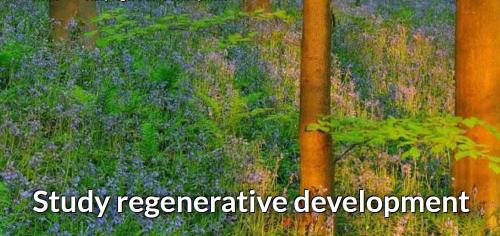Regenerative Development and Design: Its origins, essence, practice and potental as a meta-disciplines to elevate governance, innovation and planetary health

Regenerative Development and Design: Its origins, essence, practice and potental as a meta-disciplines to elevate governance, innovation and planetary health
Study commissioned by the Belgian Federal Public service that lays out the origins of regenerative development design, based largely on the work of Mang and Haggard. The study contributes an analysis of EU related regulations and how they reflect and might be be adapted to such principles.
From the study: "Policy-making can be an important lever to create the appropriate enabling conditions for regenerative development. RDD can help local governments to understand, acknowledge and treasure the living systems they depend on. It can help all kinds of governance to harmonize human and living systems development in ways that ensure longevity and security over the long term. This is especially important when it comes to biodiversity as few people understand that species richness is pivotal for the survival of the living systems that underpin the life support system of our planet. Biodiversity is not only vital in terms of the food webs on which we depend, biodiversity is also crucial when it comes to essential planetary processes like oxygen production, carbon draw down, climate regulation, nutrient cycling and soil formation. Dwindling species richness can therefore destabilize the planetary processes on which life depends. Our analyses of existing EU legislation and expressed ambitions shows that these provide a sound foundation to evolve future legislation and ambitions towards regenerative development, a developmental approach that fosters thriving living socio-ecological systems that are beneficial for all life on Earth."
by Leen Gorissen, Karla Bonaldi, Piet Haerens and Lénia Rato, for the Belgian Federal Public Service
for Health, Food Chain Safety and Environment
